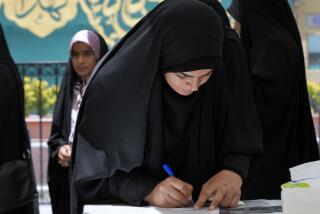Son of Shah Calls for Unity Among Foes of Khomeini
- Share via
Saying he has seen “the spark of a new awakening” among Iranians living in exile, Reza Pahlavi II, the man who would be king of Iran, called Sunday for unity among political factions seeking to depose the Ayatollah Ruhollah Khomeini’s regime.
“This is no time for divisive labels--monarchist or republican, left or right,” the 28-year-old eldest son of the late Shah Mohammed Reza Pahlavi told a cheering crowd of about 12,000 at the Los Angeles Memorial Sports Arena.
The audience, members of the largest Iranian community outside Iran, was on its feet dozens of times, waving green, white and red Iranian flags and shouting: “Javid Shah!” or “Long Live the Shah!”
Pahlavi, heir to Iran’s peacock throne but the ruler of no country, stepped up his campaign for democracy in his homeland by calling upon intellectuals, young people, professionals, political leaders and “personalities inside and outside the country to encourage cooperation, while respecting diversity of tastes and ideologies.”
Speech in Farsi
Speaking in Farsi, he indicted Khomeini as a despot whose regime “has spilled the blood of hundreds of thousands of Iranians, caused the wholesale destruction of the country, engaged in war and then snatched defeat from the jaws of victory and reduced Iran’s prestige in the world to naught.”
Several times, the crowd spontaneously chanted: “Marg bar Khomeini (Death to Khomeini)” as Pahlavi spoke on the 10th anniversary of Khomeini’s assumption of power.
“This is not a day for celebration, nor is it a day of mourning,” Pahlavi said. “This is a day to honor the memory of all our compatriots who lost their lives in war, in prisons and in the torture chambers of this bloodthirsty regime.”
He urged the crowd “to pledge here and now to spare no effort” in continuing the struggle of those who have died “to final victory and liberation of our nation.”
Before the speech, the crowd had been whipped into a nationalistic fervor in a pep rally atmosphere with speakers leading such chants as “Iran, Iran, stay well. Send Khomeini to Hell.”
Security was tight, with authorities insisting that attendees go through metal detectors. About 100 uniformed Los Angeles police officers, aided by federal agents, were at the arena, in addition to private security guards.
Inside, Farsi-language banners calling for Khomeini’s overthrow were hung from railings, along aisles and on seats. Among them was one that read, “Our goal is to unite and overthrow the regime of blood and terror in Iran.”
Speech organizers trumpeted the event’s significance by pointing out that tapes of it would be replayed clandestinely inside Iran.
“He (Pahlavi) has always ignored the anniversary of his father’s downfall in the past,” said an organizer, who declined to be identified.
In recent months, Pahlavi, who proclaimed himself shah after his father died in 1980, has picked up the pace of his political activity by giving speeches in Europe and the United States preaching democracy.
If the Islamic fundamentalists who rule Iran are overthrown, a constitutional monarchy under a democratic form of government would be an option that Pahlavi would welcome, those close to him say.
He said he favors following the example set by Spain’s King Juan Carlos I, who became a constitutional monarch after dictator Francisco Franco died in 1975.
A sampling of opinion Sunday in Westwood, where many Iranians congregate, suggested that there is some difference of opinion over whether Pahlavi should return to Iran.
“The Shah--his father--was basically good for Iran. But we don’t need a return to his torturing, killing,” said “Beni” while browsing at a popular Iranian bookstore. “All we might be doing is trading one crazy man for another.”
Another customer at the Ketab bookstore, who asked that her name not be published, said Pahlavi might be welcomed in Iran, if he denounced his father’s policies.
“My relatives there tell me many Iranian people want peace and tranquility and perhaps he can bring that,” she said.
At the nearby Kaboby Restaurant, opinion also seemed to be divided. One woman diner said, “Khomeini must go. But what to replace him with is the question.”
According to the co-publisher of a Farsi-English telephone directory specifically aimed at Iranians here, an overwhelming majority of Iranian expatriates oppose Khomeini. They also oppose Pahlavi, but in fewer numbers.
More to Read
Sign up for Essential California
The most important California stories and recommendations in your inbox every morning.
You may occasionally receive promotional content from the Los Angeles Times.













